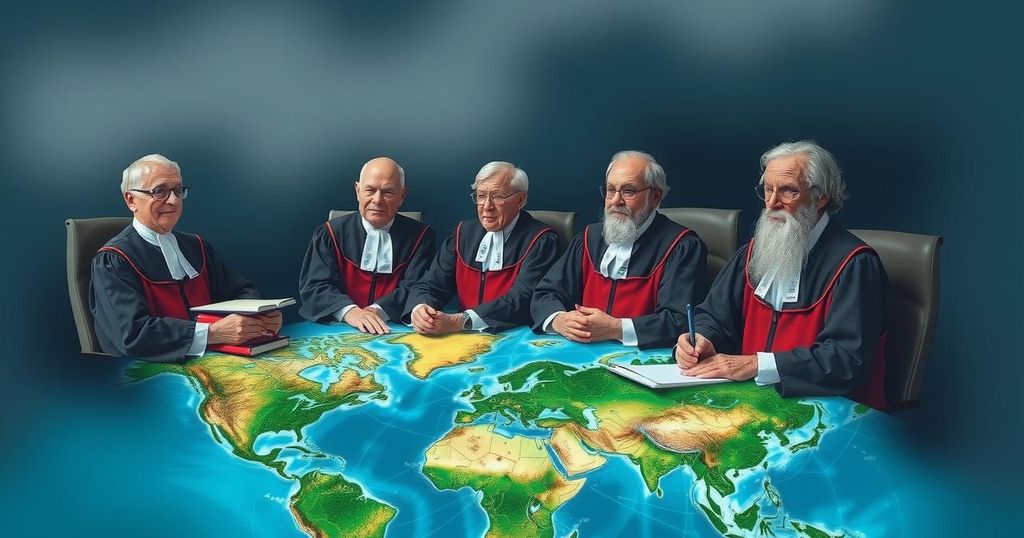Global news
AFRICA, ASIA, AUSTRALIA, BENJAMIN NETANYAHU, BRAZIL, CHINA, COURT DECISION, CUBA, EUROPE, FRANCE, GERMANY, HAGUE, ICC, ICJ, INDIA, INTERNATIONAL LAW, JAPAN, LEBANON, LEGAL SYSTEM, MEXICO, NA, NAWAF SALAM, NETHERLANDS, NORTH AMERICA, OCEANIA, PARIS AGREEMENT, PEACE PALACE, PERMANENT COURT OF ARBITRATION, PHILIPPINES, ROMANIA, SLOVAKIA, SOMALIA, SOUTH AFRICA, SOUTH AMERICA, SUSTAINABLE DEVELOPMENT, THE COURT, THE HAGUE, UGANDA, UN GENERAL ASSEMBLY, UNITED STATES, UNITED STATES OF AMERICA, VANUATU
Jamal Walker
0 Comments
ICJ Conducts Hearings on Climate Change Obligations Amidst Global Concerns
The International Court of Justice is currently holding hearings for an Advisory Opinion on States’ obligations concerning climate change, requested by the UNGA. The Court is evaluating financial liabilities for climate change contributions, with oral statements provided by over 100 nations. Four judges submitted follow-up questions to be answered by December 20, with final opinions expected in mid to late 2025.
In December 2023, the International Court of Justice (ICJ) conducted hearings concerning an Advisory Opinion on the Responsibilities of States regarding Climate Change, requested by the United Nations General Assembly (UNGA). The Court is tasked with assessing the financial liabilities of nations concerning climate change contributions and determining the necessary actions they should implement to mitigate its impacts. Following the hearings concluded on December 13, four judges submitted queries to be addressed by the involved parties by December 20.
Established in 1945 via the UN Charter, the ICJ serves as a forum for countries to amicably resolve civil disputes. Located in The Hague, Netherlands, the Court operates independently, alongside the International Criminal Court, which recently issued an arrest warrant for Israeli Prime Minister Benjamin Netanyahu. The ICJ is comprised of 15 rotating judges, each serving a term of nine years, with Judge Nawaf Salam from Lebanon currently presiding.
The UNGA’s request for the ICJ’s advisory opinion, initiated on March 29, 2023, seeks clarity on the international legal obligations of nations to ensure climate protection, particularly concerning greenhouse gas emissions. Additionally, the questions posed by the UNGA delve into the consequences for states causing significant harm to vulnerable countries and future generations impacted by climate change.
The hearings featured contributions from over 100 countries, with statements focusing on the United Nations Framework Convention on Climate Change and the Paris Agreement. Key discussions revolved around the interpretation of obligations under the Paris Agreement versus additional responsibilities that may create demands for reparations for those nations adversely affected by climate change. Participants presented diverse views, with developed nations arguing for a specific treaty approach while developing countries advocated for reparations based on human rights violations.
At the conclusion of the hearings, four judges submitted questions aiming to elucidate various legal implications of state obligations under international law. Specifically, Judge Sarah Cleveland inquired about fossil fuel production responsibilities, while Judge Dire Tladi sought clarification on the Paris Agreement’s obligations regarding nationally determined contributions. Additionally, Judge Bogdan-Lucian Auresco asked about the right to a clean environment, and Judge Hilary Charlesworth explored the implications of states’ declarations related to compensation rights within the framework of climate agreements.
Although no specific timeline has been set for the ICJ’s final advisory opinion due to the intricate nature of the subject matter, it is anticipated to be delivered in mid to late 2025.
The International Court of Justice, commonly referred to as the World Court, is a primary judicial entity of the United Nations. Its jurisdiction encompasses resolving disputes between nations and providing advisory opinions on legal questions referred by UN agencies. The recent hearings on climate change have arisen in response to increasing global concerns about the legal responsibilities of nations amidst climate change, particularly regarding obligations to mitigate harmful greenhouse gas emissions. This marks a significant initiative in recognizing the legal ramifications of climate impacts, especially for vulnerable nations.
The ongoing proceedings at the International Court of Justice signify a pivotal moment in addressing global climate change liabilities and obligations. With the potential for significant legal implications, the Court’s advisory opinion will likely serve as a crucial reference for future climate litigation and international policy endeavors. As nations await the responses to the judges’ inquiries, it remains to be seen how these discussions will influence global perspectives on climate accountability.
Original Source: www.forbes.com




Post Comment